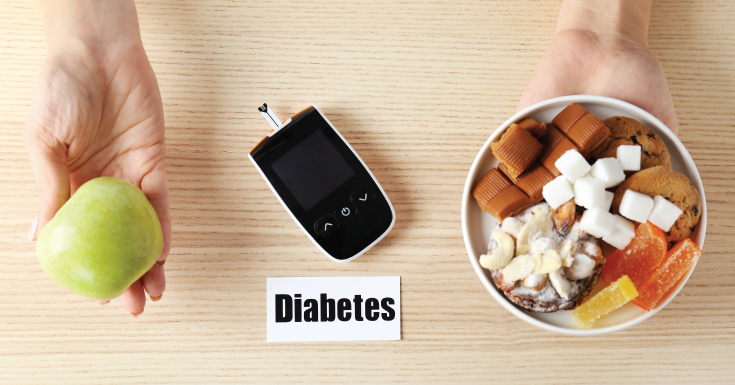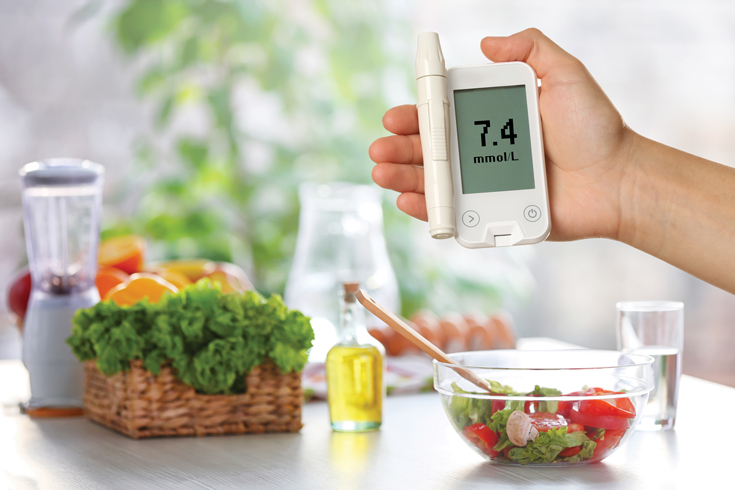In Malaysia, the most recent National Health and Morbidity Survey 2019 has shown that 1 in 5 people in Malaysia had diabetes (approximately 3.9 million people). Unfortunately, about half of these people do not know that are afflicted with this disease.
Diabetes is unfortunately a lifelong disease. Often, patients do not feel particularly unwell, however long term chronic high blood glucose affects our body slowly over time. Therefore, it is important to remain compliant with our medications even though there are no symptoms.
While diabetes is a common disease, there are many myths and misconceptions about it. Here’s the truth behind 10 most popular myths about diabetes.
MYTH #1 Diabetes is mainly caused by consuming too much sugar or sweets
TRUTH: Consuming too much sugar or sweets does not cause diabetes. Type 2 Diabetes occurs when your body can no longer regulate blood sugar levels effectively. This can happen when your pancreas is unable to produce insulin or insulin action becomes inefficient causing insulin resistance. However, people who are obese (not necessarily from consuming sugars or sweets) are at greater risk of developing Type 2 diabetes.
MYTH #2 Diabetes is a disease that mainly affects middle-aged people. If you are young and have no symptoms, you won’t get diabetes.
TRUTH: Diabetes can happen to anyone regardless of age. In recent years, we have seen younger people diagnosed with Type 2 diabetes because there is a sharp rise in obesity in the country. Symptoms of diabetes can be subtle; thus, people may think they have no symptoms but they actually do upon further questioning. Symptoms include excessive thirst, frequent urination, tiredness, feeling hungry frequently, weight loss, frequent infection, blurred vision and slow healing wounds.
MYTH #3 If you have diabetes, just take medicine and you will be fine.
TRUTH: It is important to take your medicine regularly, but you would also need to go for regular check-ups. Diabetes affects many parts of the body including the kidneys, nerves, eyes, feet and heart. By having regular check-ups, the doctor can pick up any early signs of complications caused by diabetes and administer appropriate treatment. Early detection and early intervention often give the best outcome.
MYTH #4 Diabetes is mainly treated by controlling your diet like limiting the consumption of sugar, rice or noodles.
TRUTH: The mainstay of diabetes treatment is changing your lifestyle and diet on a long-term basis. However, for most people, changing diet alone is not enough and therefore, medication is also needed to ensure adequate sugar control. Limiting the consumption of sugar, rice and noodle will definitely help with controlling diabetes on top of taking diabetes medicine.
MYTH #5 When it comes to blood sugar level control, the lower the better.
TRUTH: We aim to control a patient’s blood sugar level to reach between 4 mmol/l to 8 mmol/l. This would be ideal. Any levels below 4 mmol/l is too low – this is what we call hypoglycaemia. In this instance, we usually recommend taking small amounts of carbohydrate to bring your blood sugar back to normal levels.
MYTH #6 As long as you are taking sugar-lowering drugs, you don’t have to control your diet.
TRUTH: As mentioned, the mainstay of diabetes treatment is changing your lifestyle and diet on a long-term basis. Even if patients are on diabetes medications, they would still need to control their dietary intake by reducing sugary foods and controlling their carbohydrate intake.
MYTH #7 When it comes to diabetes tests, you need to only look at blood sugar levels.
TRUTH: When a patient comes in for a regular diabetes check-up, we don’t only check their blood sugar levels. We also check their kidney function, blood pressure and cholesterol levels, examine their feet for sensation and pulses as well check their eyes by looking at the blood vessels in their retina. This is because diabetes can cause leaky blood vessels in the retina. We also enquire if they have any other symptoms that may suggest they have an underlying heart disease or peripheral vascular disease.
MYTH #8 If you have been diagnosed with diabetes but have no symptoms, you don’t have to get tested nor undergo any treatment.
TRUTH: No, this is not true at all. Anyone who has been diagnosed with diabetes needs to see a doctor or a diabetes specialist at least once a year to check on their diabetes and other complications they may have. It also allows your doctor to review your diabetes, blood pressure medicine and cholesterol medicine to ensure you are on appropriate medications. Many people with diabetes may have no symptoms. However, diabetes is a major risk factor for vascular problems in the heart, brain and legs. Other health problems associated with diabetes include high blood pressure, high cholesterol levels and kidney disease which often produce no symptoms. Therefore, it is important to continue treatment and have regular check-ups with a diabetes specialist.
MYTH #9 If you manage to control your blood sugar level within the normal range, you don’t have to test your blood sugar level every day or take medication.
TRUTH: I would still recommend getting blood tests once or twice a year to ensure that your blood sugar levels continue to be good. This specific blood test is called HbA1c and it tells us how well your blood sugar levels have been in the last 3 months. It will also give you an opportunity to check in with your diabetes doctor to ensure you are in overall good health.
MYTH #10 Diabetes medications will cause kidney failure.
TRUTH: Taking diabetes medications and controlling your blood sugar level actually help to prevent kidney failure. Uncontrolled high blood sugar levels will cause blood vessels in the kidneys to be leaky causing protein leakage into your urine. Over time, this will cause the kidney function to deteriorate and can lead to kidney failure. It is not the diabetes medications that cause kidney failure.
I strongly advise people above the age of 40 years old to go get a simple blood test from their local pharmacist to check if they have diabetes at least once a year. It is better to find out sooner rather than later as there are many ways of treating diabetes that is effective. More importantly, by treating diabetes early, we can prevent some of the complications of diabetes that we so often hear about.

Consultant Physician and Endocrinologist
Sunway Medical Centre

















